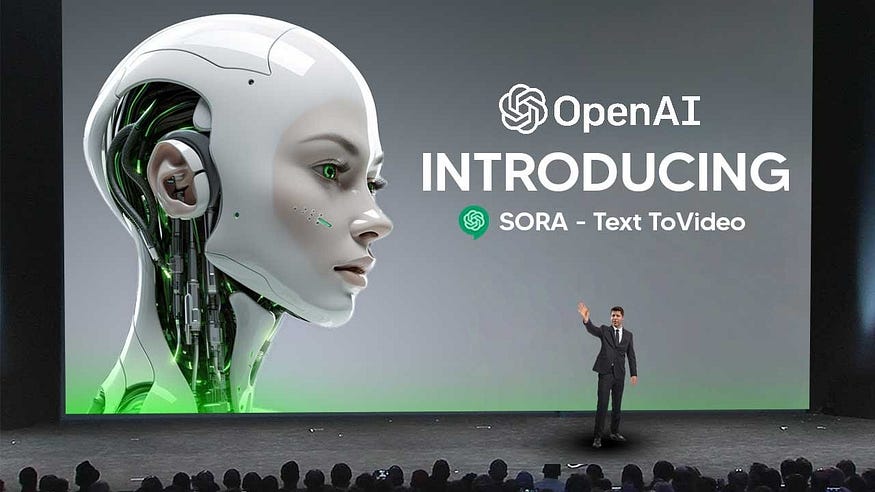OpenAI Takes Text-to-Video to New Heights | OpenAI Sora
 Hemant Yadav
Hemant Yadav
Introduction:
In the rapidly evolving landscape of artificial intelligence (AI) and content creation, OpenAI’s latest breakthrough, Sora, stands as a beacon of innovation. Representing the culmination of years of research and development, Sora introduces a paradigm shift in the way we conceive and produce video content. With its remarkable ability to translate simple text prompts into vivid, lifelike videos, Sora not only revolutionizes traditional filmmaking but also opens up a world of possibilities across various industries.

Revolutionizing Content Creation
Sora’s capabilities are truly revolutionary. Leveraging the foundational principles of OpenAI’s renowned GPT models and scaling them to handle video generation, Sora transcends the limitations of previous AI technologies. The result is a tool that empowers content creators with unprecedented freedom and flexibility. Whether it’s crafting intricate character animations, dynamic visual effects, or expansive virtual environments, Sora enables creators to bring their visions to life in ways previously unimaginable.
What sets Sora apart is its ability to generate content that rivals the quality and fidelity of human-produced videos. By synthesizing vast amounts of data and leveraging advanced machine learning algorithms, Sora is able to produce videos that are not only visually stunning but also contextually relevant and emotionally resonant. This opens up a wealth of opportunities for creators to explore new storytelling techniques, experiment with visual aesthetics, and engage audiences in novel ways.
Moreover, Sora’s versatility extends far beyond the realm of traditional filmmaking. Its capabilities hold promise for industries ranging from advertising and marketing to education and entertainment. Imagine being able to generate custom video content tailored to specific audiences or create immersive virtual experiences with ease. With Sora, the only limit is your imagination.
Navigating Ethical Terrain
However, as with any groundbreaking technology, Sora’s emergence also raises important ethical questions. The ability to generate convincing video content from text prompts has the potential to be both a blessing and a curse. On one hand, it opens up new avenues for creativity and expression, empowering individuals and businesses to create compelling content with ease. On the other hand, it also raises concerns about misinformation, manipulation, and privacy.
The rise of deepfake technology has already demonstrated the potential for AI-generated content to be used for malicious purposes, such as spreading false information or manipulating public opinion. As Sora becomes more widely available, it’s crucial that we establish clear guidelines and regulations governing its use. Content creators and platforms must take responsibility for ensuring the authenticity and integrity of the content they produce, and individuals need to be educated about the existence of AI-generated content and how to discern between real and fake.
Exploring Sora’s Implications
Yet, Sora’s significance extends far beyond its immediate applications in filmmaking and content creation. At its core, Sora represents a significant step towards achieving artificial general intelligence (AGI) — a system capable of understanding and simulating the complexities of the real world. By training on vast amounts of data from diverse sources, Sora develops a deeper understanding of the physical world, from the laws of physics to human behavior.
As Sora and similar AI models continue to evolve, they have the potential to revolutionize various fields, from healthcare and robotics to climate modeling and urban planning. Imagine AI systems that can simulate the effects of climate change or predict the outcome of medical treatments with unprecedented accuracy. The possibilities are endless, but so too are the ethical and societal implications.
Commercial Opportunities and Societal Impact
From a commercial standpoint, Sora opens up a wealth of opportunities for entrepreneurs, businesses, and creatives alike. By streamlining video production processes and reducing costs, Sora democratizes access to high-quality video content, leveling the playing field for aspiring filmmakers and content creators. Moreover, Sora’s ability to personalize content experiences could revolutionize industries such as e-commerce, advertising, and online education.
However, with these opportunities come significant challenges. The widespread adoption of AI-generated content raises concerns about job displacement, economic inequality, and algorithmic bias. It’s essential to address these challenges proactively and ensure that the benefits of AI technology are equitably distributed across society.
Looking Ahead
As we stand on the cusp of a new era in AI and content creation, it’s crucial to approach the future with caution and foresight. While Sora represents a remarkable achievement in AI technology, it also poses complex ethical, social, and economic challenges that must be addressed. By fostering collaboration, innovation, and responsible stewardship of AI technology, we can harness the full potential of Sora and ensure a brighter future for all.
Conclusion
In conclusion, Sora’s emergence marks a pivotal moment in the evolution of AI and content creation. With its ability to generate lifelike video content from simple text prompts, Sora promises to revolutionize filmmaking, advertising, education, and beyond. However, with great power comes great responsibility, and it’s essential that we navigate the ethical, social, and economic implications of AI technology with care and consideration. By doing so, we can unlock the full potential of Sora while safeguarding the interests of society as a whole.
Subscribe to my newsletter
Read articles from Hemant Yadav directly inside your inbox. Subscribe to the newsletter, and don't miss out.
Written by
